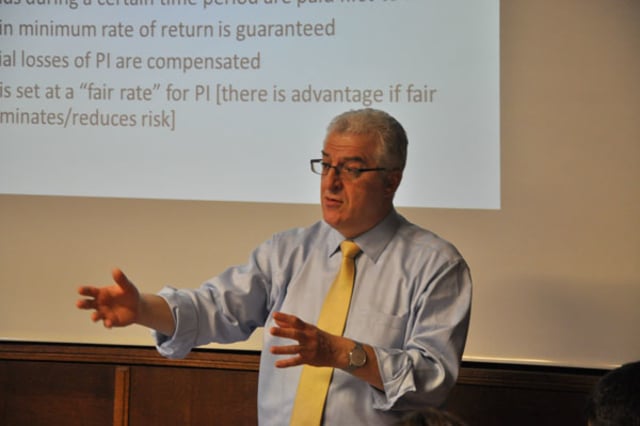The following blog post is another contributory piece by Emanuela Matei, Associate Researcher at the Centre of European Legal Studies, Bucharest. Matei holds a Juris Master in European Business Law (Lund University, June 2012), a Magister legum (Lund University, June 2010) and a BSc in Economics & Business Administration (Lund University, June 2009). We are very glad to welcome her […]
State Aid Law
Blog
State Aid Uncovered Blog
In Lexxion’s State Aid Uncovered blog, Prof. Phedon Nicolaides publishes weekly critical analyses of recent State aid judgments and decisions. Each post presents the key points of a court judgment or EU Commission decision, places it in the context of similar case law or practice, assesses the underlying reasoning and highlights any inconsistencies or contradictions.
Guest contributions from other State aid experts will also be published on the blog at irregular intervals to complement the content of the blog posts.
3. December 2015 |
Guest State Aid Blog
by Emanuela Matei
1. December 2015 |
State Aid Uncovered
by Lexxion Publisher
Find below the court’s diary for all State aid cases. Would you like to write a comment on one of them? Please don’t hesitate and get in touch with us ([email protected]), we are happy to publish your comment on the blog Thursday 07/12/2015 Judgment in Case T-242/12 – SNCF v Commission (General Court – Seventh Chamber) Thursday 17/12/2015 Judgment in […]
1. December 2015 |
State Aid Uncovered
by Phedon Nicolaides
State aid is granted on the date the relevant public authority makes an irrevocable commitment to grant it or creates a legal entitlement for the beneficiary. Loans that impose public policy obligations on borrowers are not in conformity with the behaviour of a private investor. Introduction This is a rather long article because it examines a rich case that […]
24. November 2015 |
State Aid Uncovered
by Phedon Nicolaides
Public investment is free of State aid when it is made at the same time and on equal terms with investments by private investors. In the absence of an equivalent private investment, public investment does not constitute State aid when it is demonstrated ex ante that it is capable of generating market rates of return. Introduction Public authorities are […]
16. November 2015 |
State Aid Uncovered
by Phedon Nicolaides
Favourable tax treatment to alleviate “structural disadvantages” suffered by certain companies is a selective measure that falls within the scope of Article 107(1). Introduction Member States use taxes not just to raise revenue but also as instruments of public policy. They impose taxes on activities they want to discourage [e.g. smoking, driving] and they relieve from taxes activities they […]
11. November 2015 |
Guest State Aid Blog
by Dimitrios Kyriazis
The following is a summary of the main points that were presented and the issues that were discussed in the seminar on State aid in Tax Measures that was held in Brussels on 26-27 October 2015. The summary has been prepared for information purposes only and it is not meant to be a precise record of the proceedings of the […]
10. November 2015 |
State Aid Uncovered
by Phedon Nicolaides
The value of land corresponds to its market price that can be determined through open and unconditional bidding. If a price cannot be determined through bidding, then expert valuation is an alternative method for establishing the value of land. Expert valuation has to be carried out ex ante, by a recognised independent surveyor, on the basis of reasonable assumptions and […]
5. November 2015 |
Guest State Aid Blog
by Lexxion Publisher
Find below the court’s diary for all State aid cases. Would you like to write a comment on one of them? Please don’t hesitate and get in touch with us ([email protected]), we are happy to publish your comment on the blog. Wednesday 11/11/2015 Judgment in Case C-505/14 – Klausner Holz Niedersachsen (Court of Justice – Second Chamber) Thursday 12/11/2015 Judgment in […]
4. November 2015 |
State Aid Uncovered
by Phedon Nicolaides
Incompatible State aid must be recovered from “successor” companies which acquire previously aided companies and enable the latter to continue their operations without any change. Introduction In this article I review two decisions in which the Commission determined that incompatible aid had to be recovered from “successor” companies. Those were companies which had obtained the assets of the […]
27. October 2015 |
State Aid Uncovered
by Phedon Nicolaides
A SGEI provider does not have to be efficient by industry standards in order to receive compensation for its next extra costs. Although the conditions for compatibility of public service compensation under Article 106(2) TFEU appear to be similar to the Altmark criteria, they have very different objectives. Introduction Even since the Altmark judgment of July 2003, public authorities […]
19. August 2014 |
State Aid Uncovered
by Phedon Nicolaides
An undertaking that has received incompatible State aid must pay it back or, if it cannot, it must be liquidated. Before a recipient of possibly incompatible State aid is liquidated, its assets can be sold off to the highest bidder. The buyer of previously subsidised assets does not benefit from State aid if i) it pays a market price and […]
12. August 2014 |
State Aid Uncovered
by Phedon Nicolaides
Competitive selection of the operator of an infrastructural facility normally eliminates State aid. However, modifications to the contract after the operator is selected may confer an advantage that constitutes State aid. Public funding that is calculated on the basis of the “funding gap” method ensures that the aid is necessary and proportional. Introduction Several recent articles in the blog […]
4. August 2014 |
State Aid Uncovered
by Phedon Nicolaides
Internal transfer of capital which is not used to fund new economic activities is not State aid. Injection of fresh capital to satisfy solvency and liquidity requirements still has to comply with State aid rules. A private investor always has the option of not injecting new capital and may opt instead to close down the business. A private investor always […]
29. July 2014 |
State Aid Uncovered
by Phedon Nicolaides
A public authority that injects capital in an undertaking [or provides any other kind of finance] must ensure that the funding can achieve the rate of return that can, in principle, satisfy a private investor. The rate that can satisfy a private investor and ensure that the funding is free of State aid is the rate that covers the cost of […]
22. July 2014 |
State Aid Uncovered
by Phedon Nicolaides
Revenue from levies on electricity users is most likely to constitute State resources. Public service obligations can be transferred from one electricity-generating company to another. Compensation for public service obligations may distinguish between controllable and uncontrollable costs. Performance benchmarking can be used as a means for inducing efficiency. Electricity levies may not directly or indirectly discriminate against imported electricity. Introduction This is a […]
16. July 2014 |
State Aid Uncovered
by Phedon Nicolaides
Public authorities and the entities they control need to ensure that injection of public money in an undertaking must satisfy the market economy investor principle, otherwise it will be considered to be State aid. Public funding of an undertaking in difficulty has to be preceded by an ex ante assessment that can show that either the recipient will be turned around […]
10. July 2014 |
State Aid Uncovered
by Phedon Nicolaides
The new GBER at a glance Common Provisions: aid must be transparent, must have incentive effect, rules on cumulation, and aid measures and awards must be published. Specific Provisions: Thirteen categories and many types of aid. Exclusions: no export aid, no mandated use of domestic products, no aid to firms in difficulty, no provisions that violate EU law, and no aid to […]
3. July 2014 |
State Aid Uncovered
by Phedon Nicolaides
Activities which are part of the performance of public duties are non-economic in nature [e.g. spatial development]. Public funding of these activities does not constitute State aid. The transfer of resources from one level of government to another is transfer between public authorities and does not constitute State aid. Competitive selected developers obtain no advantage. Purchasers of subsidised assets who pay market prices […]
25. June 2014 |
State Aid Uncovered
by Phedon Nicolaides
As more State aid measures in the future will be granted on the basis of the General Block Exemption Regulation, Member States will have to make the aid they grant more transparent. More transparency should prevent the granting of State aid that is incompatible with the internal market. However, Member States should also be assisted in identifying which public measures may contain […]
19. June 2014 |
State Aid Uncovered
by Phedon Nicolaides
Public funding of a public-private partnership for the construction and maintenance of public schools may still involve State Aid. State Aid may have an incentive effect even when it is granted to a project that has already started. The funding gap method can demonstrate the necessity and proportionality of State Aid. Introduction This article reviews Commission Decision SA.37168 concerning the construction […]























